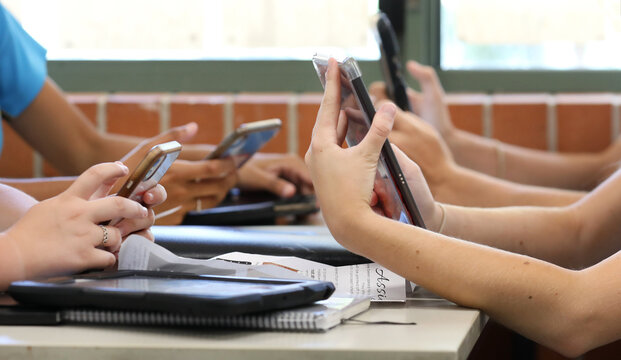We’ve all heard about, and probably experienced, the new phone policy they’ve put out this year. And of course, there’s varying opinions on it—sure, everyone hates getting their phones taken away, but it does help you focus, right? Most people, at least those who consider the issue for a while, are conflicted.
But what does this policy really entail? It’s not that different from last year. The official policy is that in every class, a student will receive a pocket to put their phone into until class is over or the teacher has turned their stoplight to green. Not all teachers do this, of course—especially not the stoplight part, as many think it’s unnecessary and would rather just tell the class when they can have their phones out, or not.
I know that personally, I’ve had many teachers who haven’t really adhered to this policy, some not even requiring us to put our phones in the pockets at all. This strategy can go one of two ways—good, if the class is focused and wants to learn, or very, very bad. An example of this could be how that one unruly and energetic class acts on a day when there’s a sub and the teacher isn’t around to provide any sort of structure. With any sort of authority figure missing, there’s no one to stop them from being on their phones all class, messing with the sub, or anything else.
It’s also worth mentioning that there are exceptions to the phone policy, such as if you don’t have a phone (for which you’re really supposed to put a card in the holder as a replacement, but who actually does that?), or need to keep it on your person for health reasons. But, generally, teachers appreciate the phone policy, and because of that tend to enforce it more.
One thing I’ve noticed about the variation between teachers is that in my higher level classes, usually the teacher doesn’t require phones to be put in the pockets, or at least gets more relaxed about it after the first few weeks. In these classes, students are usually more willing to learn and less likely to slack off on their phones, so the teacher can feel comfortable giving them more freedom.
Those classes are a solid example of where the phone policy might be ineffective, or just not necessary. But, when might it be helpful? Plenty of people would argue that the answer to that question is never, but I would disagree.
Teenagers these days are crazy addicted to their phones. At least I am, and most people I know, as well. With recent advancements in technology and algorithms designed to pull you in, it’s honestly hard not to be. TikTok’s endless engaging videos are interesting, fun, and torturous, at the same time. It seems like a good idea to scroll for a bit ‘just to take a break,’ but suddenly it’s been two hours, your back hurts, and that homework that’s due first thing tomorrow still isn’t done.
It’s impossible for TikTok, or any other thing you could find on your phone, to compete with homework you probably don’t really want to do, anyways. Why would you read that entire article for history when you could just doomscroll instead?
The introduction of the phone pockets, plus everything that’s blocked on the school computers, helps students focus on their homework instead of getting distracted. Whether they mean to or not, distraction is real.
However, there are cons. Similar to the way that strict parents make sneaky children, rules taking away something high schoolers really want are inevitably going to convince students to find ways around it. Although these attempts are usually relatively harmless, they can eventually harm a student’s education—being on your phone all class when you’re not supposed to be might be fine when you’re just watching a movie, but what about when the unit test comes around and you don’t recognize anything on it?
What can’t you do with a school computer that you could do on your phone? The list is endless: reach out to family members in a dangerous situation, use the convenient phone calculator, make a bathroom pass when you’re not already using your computer for schoolwork, listen to music, et cetera, et cetera. Ranging from annoying to downright dangerous, there are many, many reasons for students to dislike the new phone policy.
Many students share the same opinions on it. Zell Holstein, a junior, said, “I think that people don’t follow it, so I don’t care. Plus, they’re not going to pay attention without their phones anyways, they’re just gonna draw on their hands or something.” I agree with her argument, since if there’s a will, there’s a way—similar to my previous statement about students finding ways around the policy. No one can force you to do your homework if you truly don’t want to.
Hazel Peeler, another junior, restates the point I mentioned earlier. “I don’t like when teachers lock our phones in boxes,” she said. “I think it’s terrible and horrible and I think I should get my phone just in case I have some sort of emergency. And, I think locking up your phone is overdoing it. It only becomes an issue when people are on their phones constantly, which nobody does.” She talks about those few teachers that choose an alternative to the basic fabric phone pockets, using instead a locker system, or even putting the fabric phone pockets inside of a cabinet and locking it during class time.
In summary, the new phone policy has many of both pros and cons: although it may help students focus on their work when they don’t really want to, it also creates an unhappy student body who still aren’t going to get that work done. However, because the policy isn’t going away anytime soon, the best thing we can do right now is live with it—and try our best not to be on our phones constantly.










